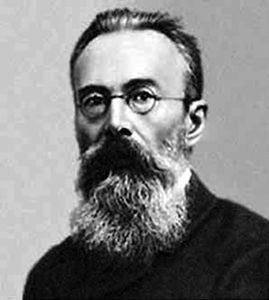The Well-Tempered Ear
Classical music: The Madison Symphony Orchestra triumphs with all-American Copland and sexy Wagner, while Rimsky-Korsakov’s “Scheherazade” is a long-winded “Bolero.” Plus, the memorial concert for Ilona Kombrink memorial is set Oct. 20.
9 Comments
ALERT: In Memoriam: A University of Wisconsin-Madison Emeritus Professor of voice, soprano Ilona Kombrink (below) died on Friday, August 9, 2013 in Stoughton, Wisconsin, at the age of 80. A Memorial Concert and celebration of her life will be held on Sunday, October 20, 2013 at 3 p.m. in the Grand Hall at Capitol Lakes Retirement Community, 333 West Main Street, Madison. A reception will follow. No word on the program yet, but you can be sure that it will be memorable since it is being organized by Edgewood College voice teacher mezzo-soprano Kathleen Otterson, who was a student of Kombrink.
By Jacob Stockinger
So, someone seated nearby asked, what did The Ear’s think of the season-opening concert by the Madison Symphony Orchestra (below in a photo by Greg Anderson)?
Here we it is.
By and large, I completely agree with the local critics (links are below) who raved about the MSO’s concert to mark the 20th anniversary season of MSO music director and conductor John DeMain (below, in a photo by Prasad).
John W. Barker in Isthmus:
http://www.thedailypage.com/daily/article.php?article=41041&sid=7853c5de52499cbd8d735576acaa10e0
Greg Hettmansberger in Madison Magazine:
But here are some other impressions I took away from the Sunday afternoon performance, which seemed well attended by an enthusiastic audience.
There can be no disagreement with the critical assessment of how professional the entire orchestra sounded and how masterly the conducting and interpreting by John DeMain proved.
Especially noteworthy was the enthralling and rapturous violin playing by concertmaster Naha Greenholtz (below top, in a photo by Greg Anderson) as well as the new principal clarinet Joseph Morris (below bottom) and such veterans as trumpeter John Aley and oboist Marc Fink.
Still, I found the special all-orchestral program a bit clunky in practice if not design.
So here are the three main points I took away:
FIRST
I am convinced that Aaron Copland’s “Appalachian Spring, which opened the concert, is The Great American Symphony, just as F. Scott Fitzgerald’s “The Great Gatsby” is The Great American Novel. So fret no longer, American composers. The summit has been scaled. Just do what you want.
In its harmonies, rhythms, themes and use of folk elements and indigenous music like the Shaker hymn “Simple Gifts” (at bottom in a popular YouTube video that features photographs by another great American artist, Ansel Adams), the dance score by Copland can’t be anything but American.
It is a gorgeous work and received a beautiful, even inspired reading from the America-born and America-trained DeMain and his players.
SECOND
I came away confirmed in my opinion that Richard Wagner’s “Liebestod” or “Love Death” from “Tristan und Isolde” is the sexist music ever written. It reminds me of the legend that the ancient Greek prophet Tiresias was allowed by the gods to make love as both a man and a woman. Then, when asked who had the better deal and received more pleasure, he was unequivocal: Women.
Indeed, this music by Wagner (below) music shows the composer’s rich imagination and makes him seem like the soul and libido of a woman dressed as a man.
It also supported my long-held contention – which other are free to disagree with — that Wagner’s orchestral writing is superior, in most cases, to his vocal writing. I, at least, generally find his instrumental music more singing and songful than his singers.
THIRD
Finally came Nikolai Rimsky-Korsakov’s “Scheherazade.” It is, all agree, a war-horse that every youngster has heard, one of the great “starter” pieces in the classical Romantic repertoire. It is a showcase that we all supposedly love by a master orchestrator and master colorist (below) who taught Igor Stravinsky. And it did bring the audience to a prolonged standing ovation.
But quasi-dissenter that I am, I have to file a minority report.
I found “Scherherazade” a bloated, repetitious and ultimately unsatisfying work. It is the Tolstoy novel of tone poems- the long-winded Russian equivalent of Ravel’s “Bolero” in its etude-like construction designed to showcase various sections of the orchestra.
The players and conductor did indeed shine and did so brilliantly. It certainly seemed a work that is more fun to conduct and perform than it is to listen to. True, the work did have memorable moments of drama and lyricism. But too often the 40 minutes of music — well, it is based on the 1,001 Nights — grew downright tedious. At least in live performance, I find the Ravel more exciting, catchy and fun, and also more easily instructive for sonic comparisons of different instruments and what they add to the score.
Oh, I found myself daydreaming, if only the first half of the MSO concert had been followed by a really great symphony by especially Brahms, or perhaps Beethoven, Dvorak or Tchaikovsky – something with substance as well as style. “Scheherazade” was sonically splashy, but compared to the Copland and Wagner it is superficial.
So there it is: What The Ear Heard at the MSO Opener.
What did you hear?
And what do you think of what The Ear heard? And how he heard it?
The Ears wants to hear.
Tags: Aaron Copland, Antonín Dvořák, Edgewood College, Great American Novel, Ilona Kombrink, Jacob Stockinger, Johannes Brahms, John DeMain, Kathleen Otterson, Leo Tolstoy, Ludwig van Beethoven, Madison Symphony Orchestra, Mezzo-soprano, Nikolai Rimsky-Korsakov, Richard Wagner, soprano, Tchaikovsky, United States, University of Wisconsin–Madison, YouTube







